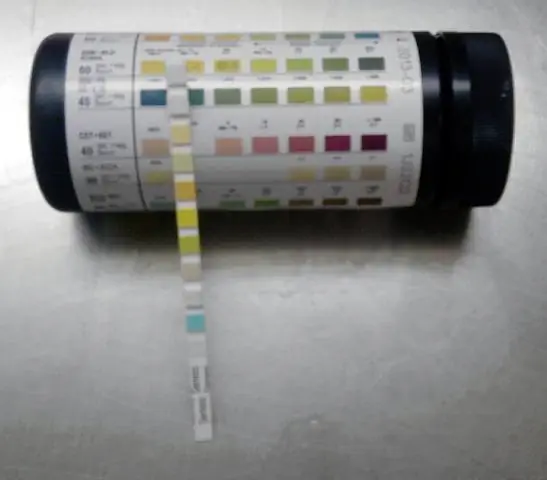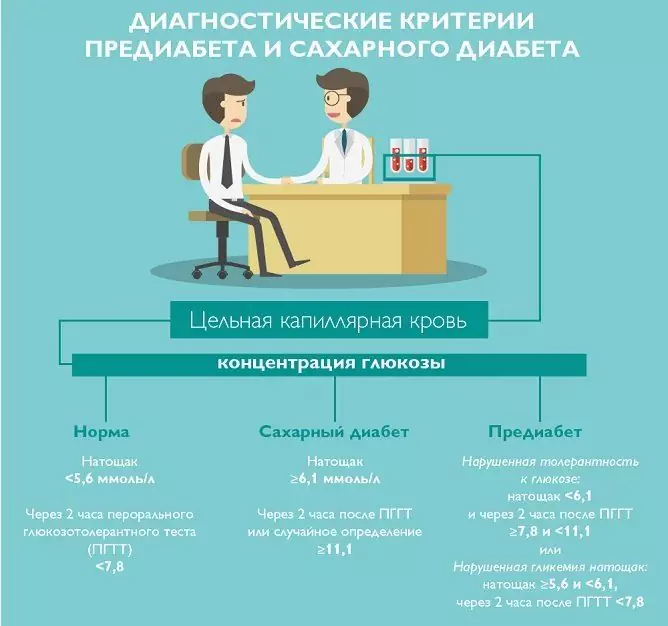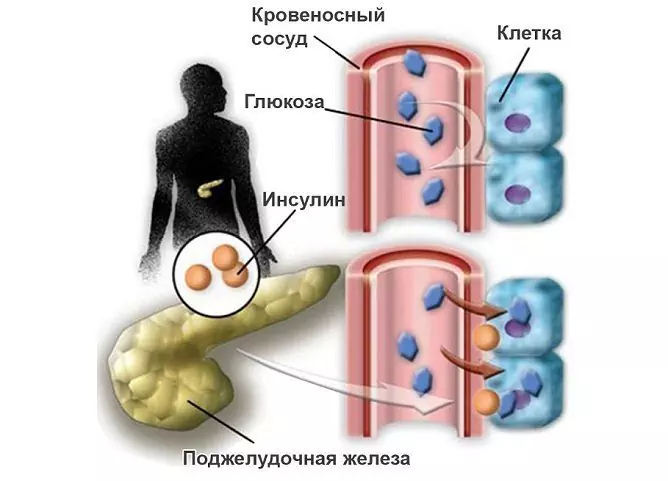- Author Rachel Wainwright wainwright@abchealthonline.com.
- Public 2023-12-15 07:39.
- Last modified 2025-11-02 20:14.
Glucose
Instructions for use:
- 1. Pharmacological action
- 2. Indications for use of the solution
- 3. Method of application
- 4. Side effects
- 5. Contraindications
- 6. Additional information
Prices in online pharmacies:
from 8 rub.
Buy

Glucose is an easily assimilated source of valuable nutrition that increases the body's energy reserves and improves its functions.
pharmachologic effect
Glucose is used as a detoxification agent (removing toxins from the body) and rehydration (replenishing fluid losses).
Isotonic glucose solution 5% is used to replenish fluid in the body. Also, this glucose solution is a source of nutrients, during the metabolism of which a large amount of energy is released in the tissues, which is necessary for the full functioning of the body.
There are also hypertonic glucose solutions (10-40%), the intravenous administration of which makes it possible to increase the osmotic pressure of the blood, improve the metabolism and antitoxic functions of the liver, and increase the flow of fluid from the tissues into the blood.
In addition, the use of a hypertonic glucose solution promotes vasodilation, enhances the contractile activity of the heart muscle and increases the volume of urine.
As a general tonic, glucose is used in chronic diseases that are accompanied by physical exhaustion.
The detoxifying properties of glucose are due to its ability to activate the liver functions to neutralize poisons, as well as a decrease in the concentration of toxins in the blood as a result of an increase in the volume of circulating fluid and increased urination.
Indications for the use of glucose solution
A glucose solution is prescribed for:
- hypoglycemia (low blood glucose);
- lack of carbohydrate nutrition;
- intoxications accompanying liver disease (liver failure, hepatitis);
- toxic infections (poisoning provoked by microbes that have entered the body with food);
- hemorrhagic diathesis (a disease of the blood system, manifested in the form of increased bleeding);
- dehydration caused by diarrhea, vomiting, or during the postoperative period;
- intoxications;
- collapse (a sharp drop in blood pressure);
- shocked.
Glucose can be used to prepare solutions of drugs for intravenous administration, as well as a component of anti-shock and blood-substituting fluids.
Mode of application

Glucose 5% can be introduced into the body in any way (intravenously, subcutaneously, into the rectum), since its osmotic pressure corresponds to the osmotic pressure of the blood. Hypertonic glucose solutions are administered only by intravenous route, since their osmotic pressure significantly exceeds that in tissues and blood.
It is recommended to increase the glucose level by oral administration (tablets) with the help of 0.5-1 g of the drug per dose. The use of a 5% glucose solution by means of an enema involves the drip introduction of 200 ml, 500 ml or 1000 ml of the drug at a time, while the daily dose should not exceed 2000 ml.
A 5% glucose solution can be injected intravenously (drip) or subcutaneously in a volume of 300-500 ml.
Hypertonic glucose solution can be prescribed in the form of a single injection of 10-100 ml or drip injection of 200-300 ml (daily dose).
Side effects
The use of recommended doses of glucose, as a rule, does not cause undesirable effects. In rare cases, the drug can provoke fever, hyperglycemia (increased blood glucose), acute left ventricular failure, hypervolemia (increased circulating blood volume), increased urine production. Local reactions of the body to the use of glucose can manifest itself in the form of thrombophlebitis, bruising, the development of infection, and local pain.
When glucose 5% is used as a solvent for other drugs, the manifestation of side effects is caused by the action of these drugs.
Contraindications
Drug-induced glucose elevation can be dangerous when:
- decompensated diabetes mellitus (always high blood sugar);
- decreased glucose tolerance;
- hyperglycemia;
- hyperosmolar coma (a special type of diabetic coma);
- hyperlactacidemia (increased blood lactic acid levels in diabetes mellitus).
Caution is required when administering glucose solution to patients with chronic renal failure, hyponatremia, and decompensated chronic heart failure.
It is allowed to use glucose during pregnancy and lactation. It should be remembered that in women who are carrying children, the level of glucose in the urine rises, which is due to hyperglycemia and relatively insufficient production of insulin. In order to prevent the development of diabetes mellitus, it is necessary to closely monitor glucose fluctuations during pregnancy.
Additional Information
Store glucose at an air temperature of 15 0 C to 25 0 C. The shelf life of the drug depends on the form of release - from 2 to 10 years.
Glucose: prices in online pharmacies
|
Drug name Price Pharmacy |
|
Glucose (tablets) 0.5 g tablets 10 pcs. RUB 8 Buy |
|
Glucose tablets 500mg 10 pcs. RUB 10 Buy |
|
Glucose (for infusion) 5% solution for infusion 200 ml 1 pc. RUB 10 Buy |
|
Glucose 10% solution for infusion 100 ml 1 pc. 22 RUB Buy |
|
Glucose with natural fruit powders 2.33 g tablets with strawberry flavor or aroma 18 pcs. RUB 25 Buy |
|
Glucose (for infusion) 5% solution for infusion 200 ml 1 pc. RUB 26 Buy |
|
Reviews Glucose (for infusion) RUB 26 Buy |
|
Glucose (for infusion) 50 mg / ml solution for infusion 200 ml 1 pc. RUB 30 Buy |
|
Glucose (for infusion) 10% solution for infusion 200 ml 1 pc. 32 RUB Buy |
|
Glucose (tablets) 0.5 g tablets 20 pcs. 32 RUB Buy |
|
Glucose (for infusion) 5% solution for infusion 250 ml 1 pc. 34 rbl. Buy |
|
Glucose (for infusion) 5% solution for infusion 250 ml 1 pc. 35 RUB Buy |
|
Glucose (for infusion) 5% solution for infusion 400 ml 1 pc. 35 RUB Buy |
|
Glucose (for injection) 40% solution for intravenous administration 10 ml 10 pcs. RUB 36 Buy |
|
Glucose (for injection) 400 mg / ml solution for intravenous administration 10 ml 10 pcs. RUB 36 Buy |
|
Glucose (for infusion) 5% solution for infusion 200 ml 1 pc. RUB 38 Buy |
|
Glucose (for infusion) 10% solution for infusion 400 ml 1 pc. RUB 40 Buy |
|
Glucose (for infusion) 5% solution for infusion 250 ml 1 pc. 41 rbl. Buy |
|
Glucose (for infusion) 5% solution for infusion 200 ml 1 pc. 41 rbl. Buy |
|
Glucose (for infusion) 10% solution for infusion 500 ml 1 pc. RUB 42 Buy |
|
Glucose (for infusion) 5% solution for infusion 500 ml 1 pc. RUB 42 Buy |
|
Glucose (for infusion) 5% solution for infusion 500 ml 1 pc. RUB 42 Buy |
|
Glucose Brown 5% solution for infusion 250 ml 1 pc. RUB 42 Buy |
|
Glucose (for infusion) 5% solution for infusion 400 ml 1 pc. 43 rbl. Buy |
|
Glucose (for infusion) 50 mg / ml solution for infusion 400 ml 1 pc. RUB 48 Buy |
|
Glucose (for infusion) 5% solution for infusion 500 ml 1 pc. RUB 50 Buy |
|
Glucose (for infusion) 5% solution for infusion 400 ml 1 pc. RUB 51 Buy |
|
Glucose (for injection) 40% solution for intravenous administration 10 ml 10 pcs. RUB 51 Buy |
|
Glucose (for injection) 400 mg / ml solution for intravenous administration 10 ml 10 pcs. 52 RUB Buy |
|
Glucose (for injection) 400 mg / ml solution for intravenous administration 10 ml 10 pcs. 52 RUB Buy |
| See all offers from pharmacies |
Information about the drug is generalized, provided for informational purposes only and does not replace the official instructions. Self-medication is hazardous to health!






